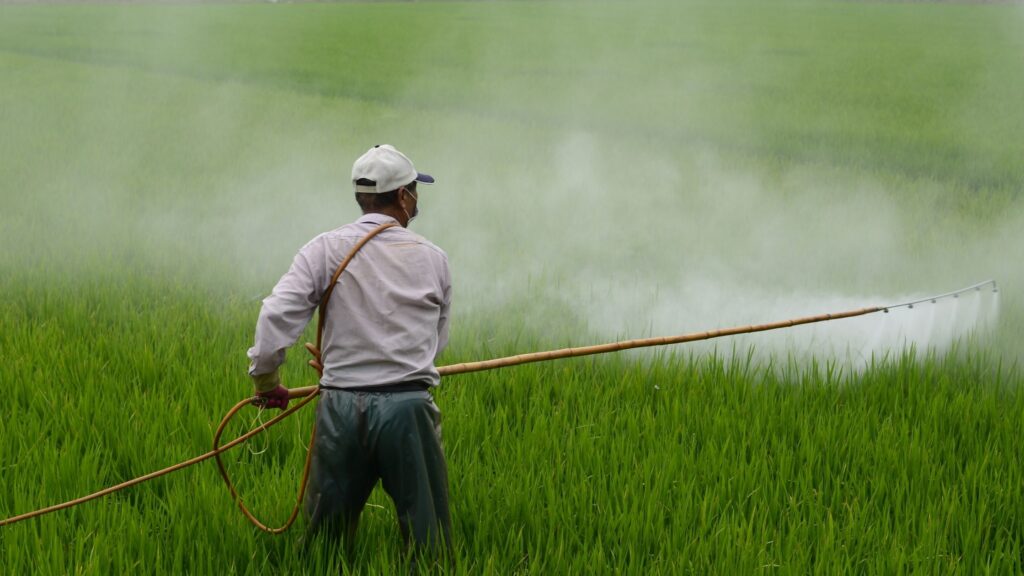Introduction
Who doesn’t like eating those fresh fruits and vegetables that look tempting and are loaded with vitamins and minerals? Indeed all of us. But sometimes, you might see some overly big fruits and have an intense color to them. We start thinking that they have been treated with chemicals so that they can be grown quickly but seldom we think about the harmful effects of Pesticides. These are pesticides that are being sprayed on fruits and vegetables. Pesticides have been used to protect the crops from insects and pests. It is used to eliminate or control pests that can damage the crops and livestock, leading to lower farmer productivity. They are mostly applied in insecticides to kill insects, herbicides to kill weeds, rodenticides to kill rodents, and fungicides to kill fungus and mold. The production of pesticides started in India in 1952, and it is now the second-largest manufacturer of pesticides after china. The growth in the production of pesticides has been steady in recent years. Pesticides are majorly used in India for cotton crops. The image below clearly shows the pattern of usage of pesticides in India. The maximum amount of pesticides used is insecticides, followed by herbicides, fungicides, and others. And imagine if the pesticides can kill insects, what can be the damage that it can do to the environment and the human body.
Harmful Effects of Pesticides
Chemical pesticides do more harm than good by severely affecting the environment and health of individuals. Let us discuss some of the harmful effects of Pesticides on different areas.
- Effect on the environment– One of the worst harmful effects of Pesticides is on the environment. It contaminates the environment and disturbs the natural ecosystem. It threatens biodiversity and has led to the extinction of many species. Pesticides pollute the soil, water, and other vegetation. It can be toxic to many organisms like birds, fishes, insects, and non-targeted plants. It leads to groundwater pollution. 58% of drinking water samples drawn from various hand pumps and wells around Bhopal were contaminated with Organo Chlorine pesticides above the EPA standards. Pesticides can also lead to air pollution by blowing away the pesticides by winds into nearby areas, causing a threat to wildlife. Studies show that pesticides remain in the atmosphere, ground, and waterways long after the work has been done. Too much movement of the pesticide can transfer the pesticide away from the target pest. This leads to reduced pest control, contamination of groundwater and surface water, and non-targeted species’ injury. It can also lead to a decrease in soil microorganisms. Pesticides can also cause harm to volatilization. Volatilization occurs when a pesticide turns into a gas or vapor after it has been sprayed and travels through the air and spread to different parts of the land, which can cause harm to the wildlife, specifically frogs. It can lead to reproductive problems in the frogs also.
- Effect on the health of humans- Pesticides can lead to a host of diseases. The research states that the use of pesticides should be done to the minimum to prevent serious illnesses. Diseases like cancer, nervous system disorders, and reproductive problems are common in people. Excessive and prolonged exposure to pesticides has also lead to problems like neurological disorders, Parkinson’s disease, childhood leukemia, lymphoma, asthma, and more. Harmful effects of pesticides include dangers to fetuses as the chemical passes through the mother during pregnancy. The statistics also suggest that women with breast cancer have more remains of pesticides in their blood instead of women who do not have breast cancer. Therefore, people are switching to more organic forms of food to prevent them from such severe disorders.
- Indoor pollution– pesticides can also cause harm indoors while we are inside our homes. These are generally found in children or pets, and from there, they are transferred in the body via the lungs and skin. The reports state that pesticides in the indoor environment can persist for years in your carpets, furniture, and toys. The U.S. Environmental Protection Agency (EPA) has found that levels of indoor pollutants can be two to five times higher than those found outdoors.
- Impact of pesticides on wildlife– The harmful effects of pesticides on wildlife are quite extensive. Pesticide exposure can lead to cancer, endocrine disruption, reproductive effects, neurotoxicity, kidney and liver damage, congenital disabilities, and developmental changes in a wide range of species. It can also change the organism’s behavior. It has also lead to decreased economic costs due to the loss of biodiversity. Wildlife is also affected by pesticides through pesticide drift, secondary poisoning, runoff into local water bodies, or groundwater contamination.
- Soil contamination– Chemical pesticides deplete the nutritional value of the food by contaminating the soil’s fertility. Increased use of pesticides has led to the loss of top cover of the ground and degrades the soil’s health. Research has found traces of pesticides in many fruits, vegetables, bread, baby food, cereals, potatoes, strawberries, etc. They have been used to kill the insect and the bacteria and not enter our bodies. Pesticides take away all the nutrition from the soil and yields poor crop.
Conclusion
There are numerous harmful effects of Pesticides. People are shifting more towards organic alternatives of food, considering their health and nutrition. Farmers are turning to organic farming and leaving the old pesticide-based repellents and lawn treatments and using organic pesticides. These come with the least or no adverse effects and are equally effective as those chemical pesticides. Countries like Canada are also trying to phase out pesticides. Therefore, pesticides should be limited, and alternatives should be thought of to reduce the harmful effects that it is causing to the environment and, therefore, human health.

